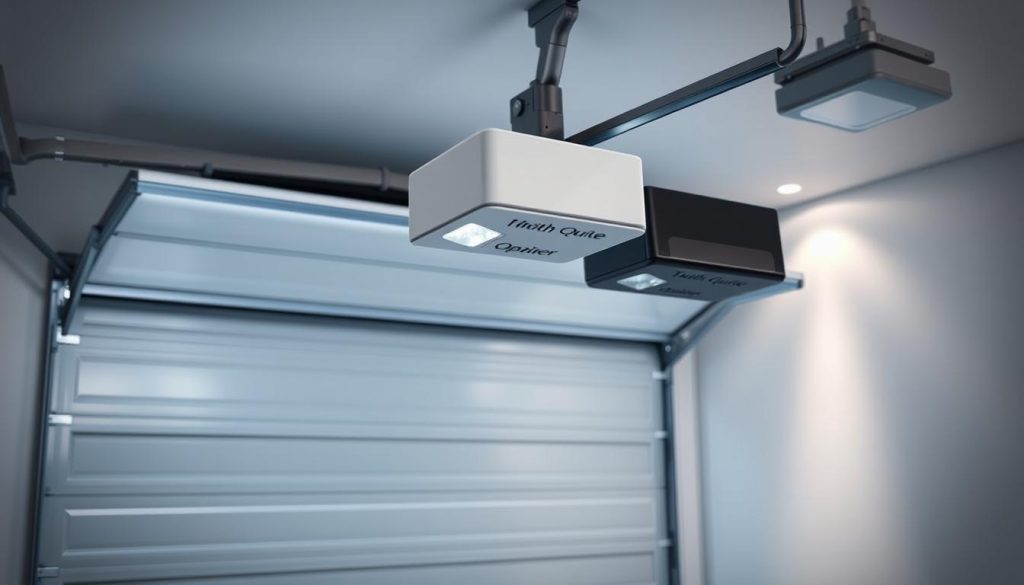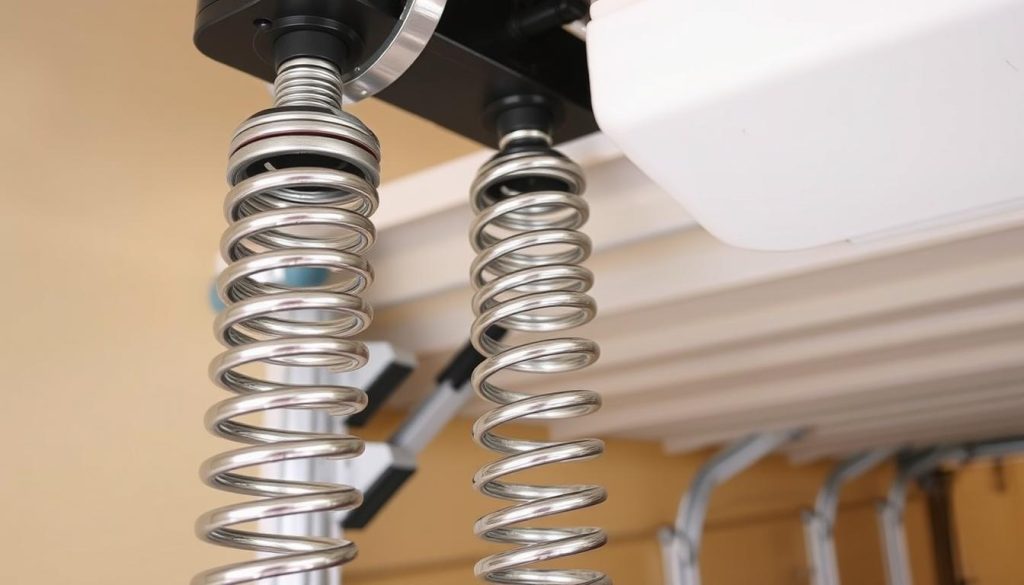Are you tired of the constant racket emanating from your garage door, disrupting the peace and quiet of your home? You’re not alone. Many homeowners struggle with noisy garage doors, but the good news is there are effective solutions to quiet them down. In this article, we’ll explore the various ways you can reduce the noise and enjoy a more peaceful living environment.
Key Takeaways
- Regular maintenance, including tightening hardware and lubricating moving parts, is essential for a quieter garage door.
- Upgrading to a belt-driven or DC-powered garage door opener can significantly reduce noise levels.
- Insulating the garage door and using nylon rollers can help absorb and minimize vibrations and noises.
- Replacing extension springs with torsion springs can lead to quieter operation and increased lifespan.
- Isolating the garage door opener from the rest of the system can help dampen noise transmission.
Tightening Loose Hardware
One of the most common culprits behind a noisy garage door is loose hardware. Over time, the bolts, nuts, and screws that hold the door and track in place can become loose due to the constant vibration of opening and closing. Retightening these fasteners using wrenches and socket sets can often quiet a garage door significantly. However, it’s crucial to avoid overtightening, as this can strip the screw holes or damage the door components.
Retightening Bolts, Nuts, and Screws
To address the issue of loose garage door hardware, follow these steps:
- Disconnect the garage door opener to prevent the door from moving unexpectedly during the tightening process.
- Identify the loose bolts, nuts, and screws using a visual inspection and by gently shaking the door.
- Use the appropriate wrenches and socket sets to tighten the fasteners, being careful not to overtighten and damage the components.
- Ensure that all hardware is snug but not excessively tight, as this can lead to rattling garage door issues in the future.
- Reconnect the garage door opener and test the door’s operation to ensure a quieter, smoother performance.
Regular maintenance by professionals can also help address loose bolts and screws before they become louder or unsafe. Preventive maintenance is an investment that can extend the lifespan of your garage door and reduce the need for costly repairs down the line.
“Ensuring that the garage door hardware is properly tightened can make a significant difference in reducing unwanted noise and vibration.”
Lubrication: The Key to Smooth Operation
Maintaining the quiet operation of your garage door goes beyond just tightening loose hardware. Another crucial step is thorough lubrication of the moving parts. This includes the rollers, hinges, springs, and other components that experience friction during the opening and closing of your garage door.
Proper garage door lubrication can significantly reduce squeaking, grinding, and other unwanted sounds. Applying a high-quality synthetic lubricant like Clopay Pro Lube to these areas helps reduce friction and ensure smooth, quiet operation. It’s recommended to lubricate your garage door every few months to maintain optimum performance.
When selecting a lubricant, it’s important to avoid using petroleum-based products on any plastic or nylon components, as these can degrade the materials over time. Instead, opt for silicone-based or Teflon-based lubricants, which offer superior noise reduction and resistance to extreme temperatures and water.
| Lubricant Type | Key Benefits | Best for |
|---|---|---|
| Silicone-based | Long-lasting, versatile, water-resistant | General garage door lubrication |
| White Lithium Grease | Heavy-duty, adhesive, water and heat resistant | Weight-bearing components like springs |
| Teflon-based | Excellent noise reduction | Quieting noisy garage door operation |
| Graphite-based | Extreme temperature resistance | Cold weather conditions |
By regularly lubricating the moving parts of your garage door, you can help reduce friction and ensure a smooth, quiet operation for years to come.
Upgrading to a Quiet Garage Door Opener
If the noisy garage door is the culprit, upgrading to a newer, quieter model can make a significant difference. Two types of garage door openers that are known for their whisper-quiet operation are belt-driven and DC-powered models.
Exploring Belt-Driven and DC-Powered Openers
Belt-driven garage door openers use a reinforced rubber belt instead of a metal chain, resulting in smoother and more silent operation. These systems generate less vibration and are generally much quieter than the older chain-drive models. DC-powered openers also tend to be quieter than their AC counterparts, as they utilize motors that are designed for reduced noise levels.
When selecting a new garage door opener, it’s crucial to ensure that the unit can handle the specific weight and size of the door being used. Upgrading to a high-quality, quiet opener may require an initial investment, but the benefits of enhanced security and uninterrupted sleep can make it a worthwhile investment.
| Opener Type | Noise Level | Vibration | Durability |
|---|---|---|---|
| Chain-driven | Noisy | High | Moderate |
| Belt-driven | Quiet | Low | High |
| DC-powered | Quiet | Low | High |
By upgrading to a quiet garage door opener, whether it be a belt-driven opener or a DC-powered opener, homeowners can enjoy a more peaceful environment and enhanced security in their homes.

Insulating for Noise Reduction
Upgrading garage door insulation can be a game-changer when it comes to reducing noise and vibrations. Insulated garage doors, whether made of steel, aluminum, or vinyl, tend to be significantly quieter than their non-insulated counterparts. The added layers of garage door insulation and sound-deadening materials help to dampen vibrations and absorb unwanted sounds.
One effective insulation option is mass-loaded vinyl, which can provide excellent vibration dampening properties. Sound-deadening mats are another popular choice, as they help to minimize impact noises and prevent sound from bouncing and vibrating through the door. Proper installation of these sound-deadening materials is crucial to maximize the noise reduction benefits.
Homeowners should also pay attention to the weather stripping at the base of the garage door. Worn or missing weather stripping can contribute to unwanted noise, so it’s essential to ensure a tight seal around the door’s perimeter.
“Garage door insulation panels can provide a thermal value of R1.47, reducing heat loss and gain, resulting in a more energy-efficient home and lower energy bills.”
By investing in high-quality insulation and maintaining the weather seals, homeowners can transform a noisy garage door into a much quieter and more peaceful environment.
Garage Door Noise Reduction with Nylon Rollers
Replacing the old, metal rollers on a garage door with nylon rollers can be a simple yet effective way to reduce noise. Nylon rollers are quieter than their steel counterparts because they create less friction as they roll along the track. The smooth, silent operation of nylon rollers can significantly improve the overall sound of the garage door system.
In addition to being quieter, nylon rollers also tend to be more durable and require less frequent lubrication than metal rollers. According to industry data, high-quality nylon garage door rollers can last 12-20 years if maintained well, compared to the typical lifespan of around 10,000 cycles for garage door springs.
Upgrading to nylon rollers, especially those with 11 ball bearings, can handle up to 100,000 cycles, enhancing the longevity of the entire garage door system. This combination of durable rollers and springs contributes to better insulation and climate control, as a well-functioning garage door plays a crucial role in the overall efficiency of the home.
| Feature | Steel Rollers | Nylon Rollers |
|---|---|---|
| Noise Level | Moderate to High | Low to Quiet |
| Durability | Around 10,000 cycles | Up to 100,000 cycles |
| Lubrication Requirement | Frequent | Less Frequent |
Homeowners can easily swap out the old rollers for new nylon ones, often without the need for professional assistance. The investment in quieter, more durable nylon rollers can significantly improve the overall operation and lifespan of the garage door system.
Replacing Extension Springs with Torsion Springs
Keeping your garage door operating smoothly and quietly is essential for a harmonious home environment. One key upgrade that can make a significant difference is replacing the traditional extension springs with a torsion spring system. Torsion springs offer a number of advantages that can enhance the overall performance and longevity of your garage door setup.
Quieter Operation and Increased Lifespan
Older garage door models often utilize extension springs, which can become a source of noise over time as they wear out and start to squeak or creak. In contrast, torsion springs are designed to operate more smoothly and quietly, thanks to their use of fewer moving parts. Torsion springs also have a significantly longer lifespan, with an average of 15,000 to 20,000 cycles compared to the 10,000 cycles typical of extension springs.
The superior durability of torsion springs translates to a more reliable and low-maintenance garage door system. Homeowners can expect their torsion spring-equipped doors to function consistently for many years, reducing the frequency of costly and disruptive spring replacements.
| Feature | Extension Springs | Torsion Springs |
|---|---|---|
| Lifespan | Around 10,000 cycles | 15,000 to 20,000 cycles |
| Noise Level | Prone to squeaking and creaking | Smoother, quieter operation |
| Complexity | Require more parts and maintenance | Simpler design with fewer components |
| Safety | Require safety cables to prevent accidents | Safer installation above the garage door |
While upgrading to a torsion spring system can be a more involved process, the long-term benefits make it a worthwhile investment for homeowners seeking a quieter, more reliable, and durable garage door setup.

Isolating the Garage Door Opener
Even the quietest garage door openers can transmit vibrations through the ceiling and into the living spaces above. To address this issue, homeowners can utilize a garage door silencer or other isolation techniques to decouple the opener from the ceiling structure. This helps to prevent the transfer of vibrations and reduce the noise impact.
Resilient channels, rubber grommets, and other vibration-dampening materials can be used to mechanically isolate the garage door opener, blocking the transmission path for unwanted sound. While this process may require some drilling and bolting, it can be an effective solution for minimizing noise from an otherwise quiet garage door opener.
A study from the University of Central Lancashire revealed that 70% of disruptions in garage door operation are due to imbalances that lead to excessive vibration. Purdue University’s Technical Assistance Programme indicated that nearly 35% of motor failures in garage door systems are a result of increased vibrations leading to mechanical wear-and-tear.
The California Energy Commission reported that almost 75% of homeowners have noticed an increase in noise levels when their garage door opener reaches five years of usage or more, mainly due to accumulated vibrations over time. By decoupling the opener from the ceiling structure and using vibration dampening materials, homeowners can effectively reduce this unwanted noise and extend the lifespan of their garage door system.
| Vibration Isolation Technique | Effectiveness |
|---|---|
| Resilient Channels | Highly effective in reducing vibration transmission |
| Rubber Grommets | Moderately effective in isolating vibrations |
| Vibration Isolation Pads | Highly effective in dampening vibrations |
By incorporating garage door opener isolation techniques, homeowners can enjoy a quieter and more peaceful living environment, even with a high-performance garage door system in place.
Garage Door Noise Reduction Through Maintenance
Maintaining your garage door system through regular inspections and preventative measures is the key to keeping it running quietly. Beyond the periodic lubrication and hardware tightening mentioned earlier, homeowners should also check for worn or damaged components that may be contributing to the noise.
This includes inspecting the rollers, hinges, springs, and other moving parts. Replacing these worn-out elements with high-quality, properly functioning replacements can help restore the smooth, quiet operation of the garage door. Establishing a regular maintenance routine, even if it’s just a quick inspection every few months, can go a long way in preventing future noise issues.
- Regular lubrication of rollers and tracks twice a year is crucial for noise reduction and proper functioning.
- Torsion type springs are ideal for noise reduction as they allow balancing of the door and prevent cable and spring friction on tracks.
- Belt-driven electric garage door openers are quieter due to the motor insulation and rubber belt.
By staying on top of garage door maintenance, homeowners can enjoy a quieter, more reliable garage door system for years to come. Simple preventative measures, such as regular lubrication and prompt replacement of worn parts, can make all the difference in keeping your garage door operating smoothly and quietly.
“Maintaining your garage door is the best way to ensure it operates quietly and efficiently for years to come.”
Conclusion
By addressing the common causes of garage door noise, such as loose hardware, friction, and outdated components, homeowners can enjoy a much quieter living environment. The key steps include tightening bolts and screws, lubricating moving parts, upgrading to a quieter opener, adding insulation, and replacing rollers and springs as needed. Regular maintenance is also crucial to maintaining a smooth, silent garage door system.
With the right strategies and a proactive approach, homeowners can create a peaceful, noise-free home, even with a busy garage door in use. Tiger Garage Doors in Perth is available to assist homeowners with any garage door maintenance, repair, or replacement needs. By implementing these quiet garage door solutions and staying on top of regular maintenance, homeowners can effectively reduce garage door noise and create a more harmonious, stress-free living space.
Investing in a quiet garage door system and maintaining it properly can have a significant impact on a home’s overall comfort and well-being. By addressing the key factors that contribute to garage door noise, homeowners can enjoy the convenience of a well-functioning garage door without the disruptive sounds that can negatively affect their quality of life.
FAQ
What are the common causes of a noisy garage door?
Common causes of a noisy garage door include loose hardware, lack of lubrication, outdated garage door openers, and worn components like rollers and springs.
How can tightening loose hardware help quiet a noisy garage door?
Retightening bolts, nuts, and screws that hold the garage door and track in place can significantly reduce noise caused by vibrations and rattling.
Why is regular lubrication important for a quiet garage door?
Applying a synthetic lubricant to the moving parts like rollers, hinges, and springs can reduce friction and eliminate squeaking, grinding, and other unwanted sounds.
What types of garage door openers are quieter than older models?
Belt-driven and DC-powered garage door openers are generally much quieter than older chain-drive and AC-powered models.
How can insulating a garage door help reduce noise?
Insulated garage doors, whether made of steel, aluminum, or vinyl, can help dampen vibrations and absorb sound, resulting in a quieter operation.
What are the benefits of upgrading to nylon rollers for a garage door?
Nylon rollers create less friction than metal rollers, resulting in smoother, quieter operation of the garage door system.
How can replacing extension springs with torsion springs improve garage door noise?
Torsion springs are designed to operate more smoothly and quietly, with a longer lifespan compared to extension springs.
What techniques can be used to isolate the garage door opener and prevent noise transmission?
Using resilient channels, rubber grommets, and other vibration-dampening materials can help decouple the opener from the ceiling structure and block the transmission of unwanted sound.
Why is regular maintenance important for keeping a garage door quiet?
Maintaining the garage door system through periodic lubrication, hardware tightening, and replacing worn components can help prevent future noise issues and ensure smooth, quiet operation.

